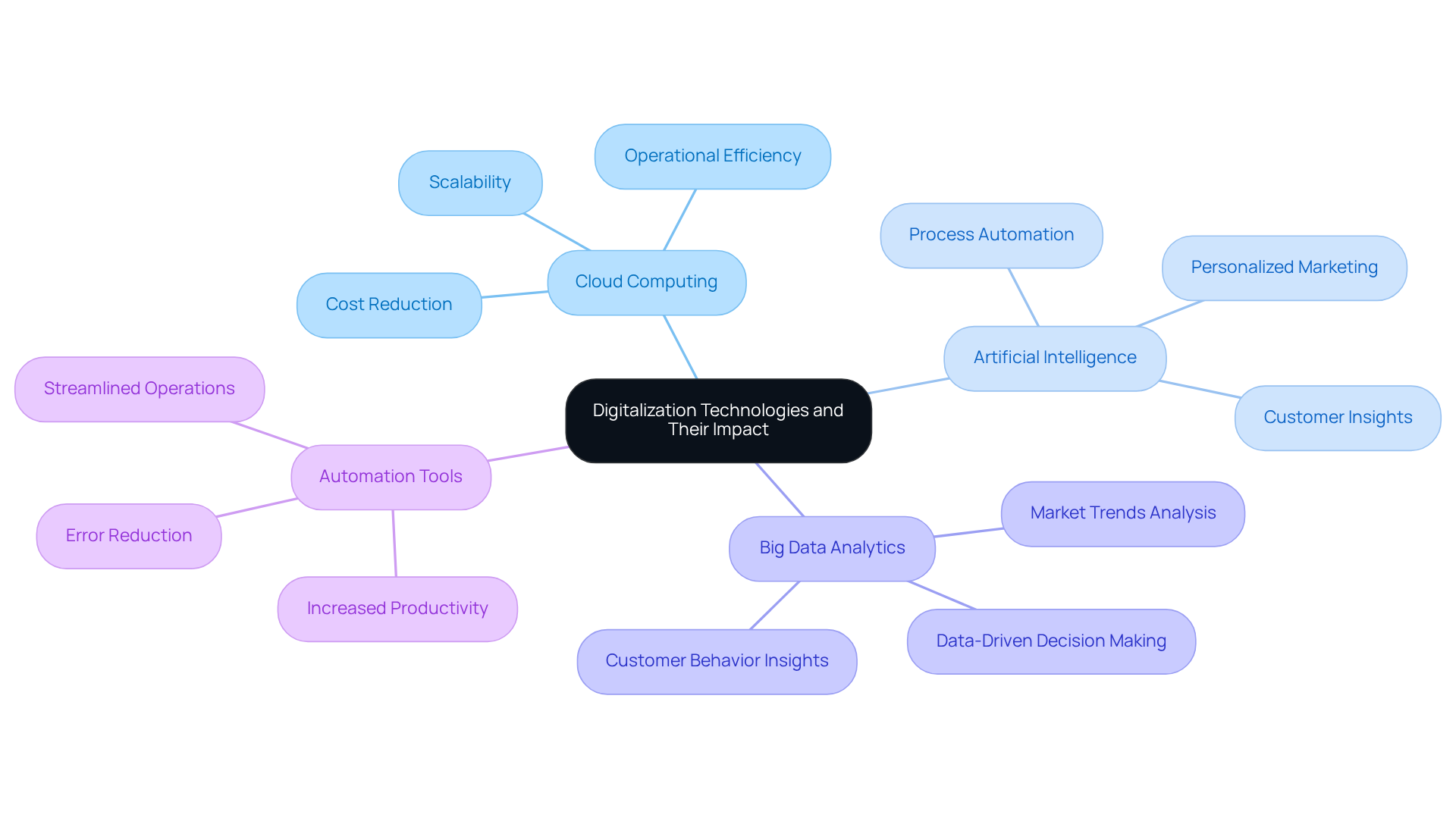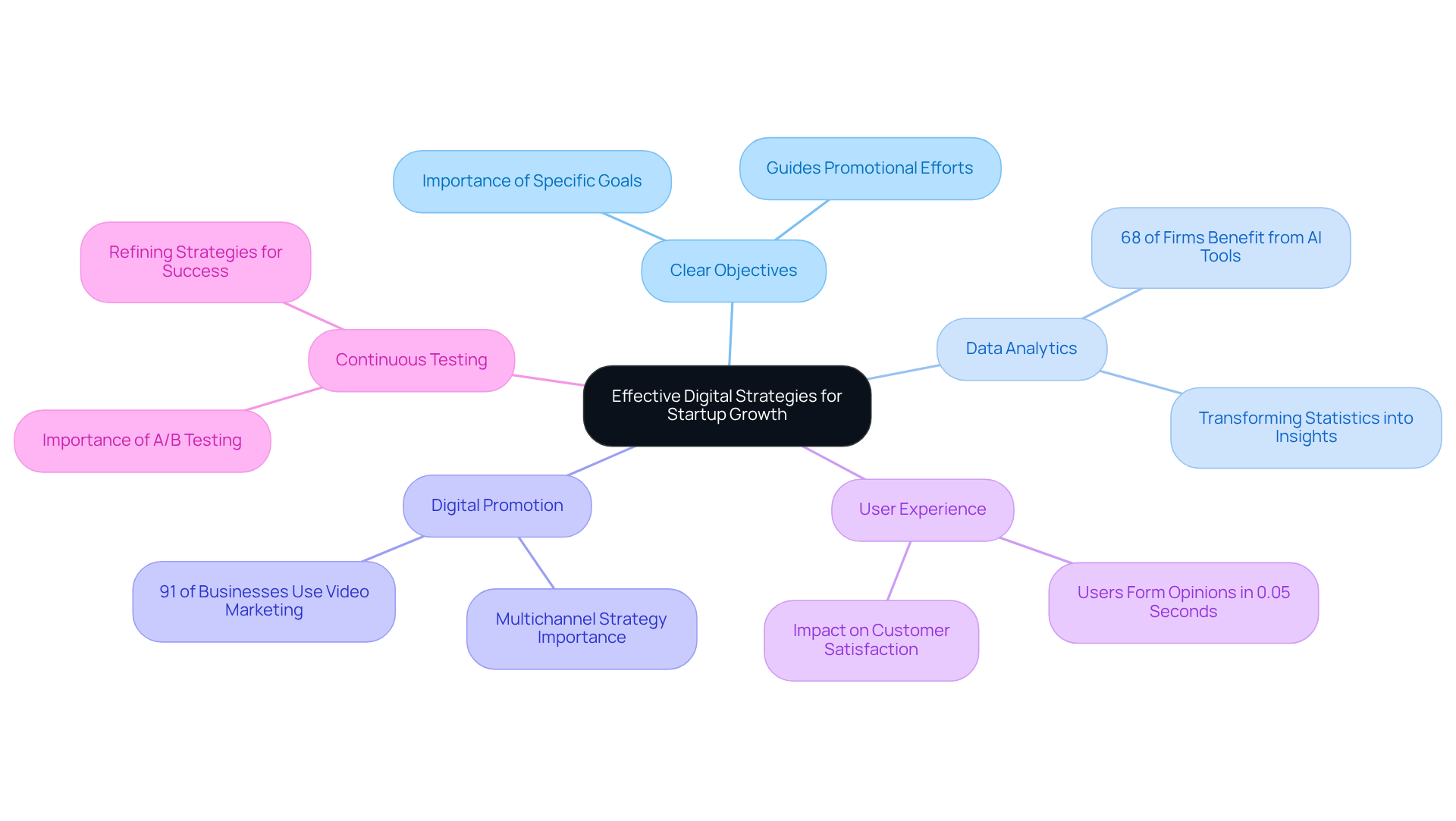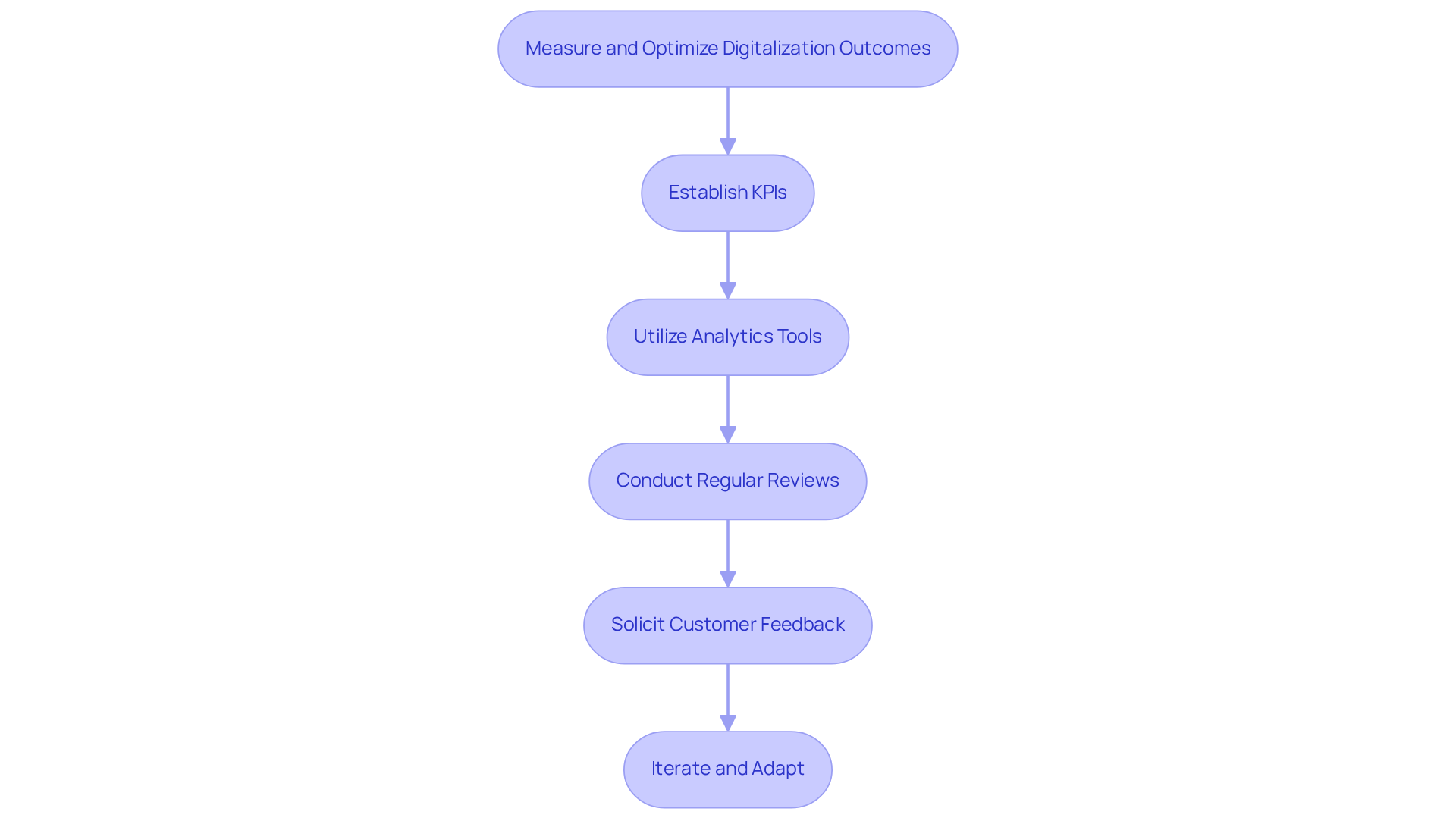Overview
In today's fast-paced digital landscape, many startups grapple with the challenge of effectively leveraging digitalization technologies. This struggle often leads to feelings of uncertainty and overwhelm, especially when trying to navigate the complexities of the digital world. It's crucial to recognize that understanding these technologies is just the beginning. Implementing effective digital strategies and measuring outcomes are vital steps that can significantly enhance operational efficiency and adaptability to market demands.
Imagine a startup founder, much like yourself, who once felt lost in the sea of digital options. They realized that by embracing these three key practices:
- Understanding the technologies
- Implementing strategic actions
- Continuously optimizing their approach
They could not only overcome their initial hurdles but also drive meaningful growth. The journey may seem daunting, but it is entirely achievable with the right guidance and support.
As you reflect on your own experiences, consider how data analytics can play a pivotal role in informing your decision-making process. Real-world examples abound, showcasing startups that have successfully transformed their operations by embracing these practices. Remember, you are not alone in this journey. By fostering a nurturing environment and sharing insights, we can collectively navigate the challenges of digitalization and emerge stronger together.
Introduction
Digitalization technologies are transforming the business landscape, presenting startups with remarkable opportunities for growth and innovation. However, many founders may feel overwhelmed by the rapid pace of change. It’s understandable; navigating tools like cloud computing, AI, and big data analytics can seem daunting. These technologies hold the potential to streamline operations and enhance customer engagement, yet the challenge lies in their effective implementation and measuring their impact.
How can startups not only keep pace but also lead in their industries? This is where support and guidance become essential. By embracing these technologies with the right strategies and insights, startups can confidently chart their path forward. Remember, you’re not alone in this journey; together, we can explore solutions that empower your venture to thrive.
Understand Digitalization Technologies and Their Impact
Many new businesses face challenges with digitalization technologies, which encompass a variety of tools and platforms essential for integrating digital processes into their operations. This can feel overwhelming, especially when considering the key technologies like cloud computing, artificial intelligence (AI), big data analytics, and automation tools. Understanding digitalization technologies is essential, as they have the potential to significantly , enhance customer interaction, and foster innovation. For instance, cloud computing can enable startups to expand their operations without incurring substantial initial infrastructure costs. Similarly, AI offers valuable insights into customer behavior, allowing for more personalized marketing strategies.
The implications of not embracing these technologies can be daunting. Startups may find themselves struggling to compete in a rapidly evolving market, unable to meet changing consumer demands. However, the implementation of digitalization technologies brings hope. By embracing digitalization technologies, startups can position themselves competitively and respond swiftly to the needs of their customers.
Real-world examples can be inspiring. Companies like Airbnb and Uber have successfully leveraged digitalization to disrupt traditional industries, providing seamless user experiences and utilizing data to optimize their services. In fact, a remarkable 93% of organizations have either embraced or plan to embrace digital-first approaches, recognizing the transformative power of digitalization technologies.
It's important for startups to thoughtfully assess which digitalization technologies align with their business goals and customer needs. This careful consideration can maximize the impact on growth and sustainability. By doing so, they not only enhance their operational capabilities but also drive significant value in an increasingly technological economy. Remember, you are not alone in this journey; there are resources and communities ready to support you as you navigate the world of digitalization.

Implement Effective Digital Strategies for Startup Growth
In the journey of implementing , startups often encounter significant challenges. Many founders struggle with defining clear objectives, which can lead to a lack of direction and misalignment within their teams. Establishing specific, measurable goals is essential, as it not only guides promotional efforts but also fosters team communication. RNO1 exemplifies this nurturing approach by being hyper-focused on delivering results from day one, ensuring that their objectives align seamlessly with client needs.
Another common hurdle is the underutilization of data analytics. Startups may find it daunting to interpret customer behavior and preferences, which can hinder growth. However, as we look toward 2025, new ventures that embrace data analytics will likely see substantial benefits. In fact, 68% of firms reported enhanced content return on investment due to AI tools. As Naveen Kumar wisely notes, transforming complex statistics into actionable insights is crucial for startups. RNO1's collaborations with various brands illustrate how data-driven strategies can effectively guide promotion and product development, ensuring that companies truly meet their target audience's needs.
Moreover, optimizing digital promotion channels can be overwhelming. Startups must invest in a multichannel strategy that resonates with their audience's preferences. For instance, with 91% of businesses utilizing video marketing, it has proven to be a powerful tool for engagement and conversion. RNO1's commitment to creative design solutions has helped brands like RentMethod and Spring Labs enhance their online presence across multiple channels, nurturing their growth.
User experience (UX) is another critical area where startups often face challenges. A seamless and intuitive online platform can significantly influence customer satisfaction and conversion rates. Research shows that users form opinions about a website in just 0.05 seconds, underscoring the necessity of effective design. RNO1's focus on futuristic UX and UI design has propelled the growth of various SaaS platforms, highlighting the importance of superior user experiences in fostering lasting connections.
Lastly, the need for continuous testing and iteration can feel daunting. Many startups may hesitate to embrace an agile approach, yet regularly testing different tactics and refining strategies is vital for success. For example, a tech startup might employ A/B testing on their website to discover which layout yields higher conversion rates. By continuously refining their approach, they can maximize their digital presence and drive growth. RNO1's cooperative strategies emphasize the significance of ongoing testing and adjustment, helping startups achieve measurable success.
By focusing on these key areas, new ventures can effectively harness digitalization technologies to enhance their growth trajectory. Additionally, businesses that implemented SEO strategies have seen a remarkable 40% increase in organic traffic, illustrating the power of defining clear objectives and leveraging data analytics. Remember, you are not alone in this journey; RNO1 is here to support you every step of the way.

Measure and Optimize Digitalization Outcomes for Continuous Improvement
To effectively measure and optimize outcomes of digitalization technologies, startups often face significant challenges. It can feel overwhelming to navigate the complexities of online performance, but there are practical steps you can take to foster growth and success.
- Establish Key Performance Indicators (KPIs): Begin by identifying KPIs that resonate with your business objectives. Essential KPIs for new businesses include website traffic, conversion rates, customer acquisition costs (CAC), and customer lifetime value (CLV). Striving for a healthy LTV:CAC ratio of 3:1 is crucial for sustainable growth. If you're a SaaS startup, consider targeting a year-over-year revenue growth rate of 100% or higher in your initial phases. Setting these KPIs and enhancing your online approaches can make a significant difference.
- Utilize Analytics Tools: Implement robust analytics tools like Google Analytics, HubSpot, or custom dashboards to monitor your performance metrics in real-time. When startups leverage digitalization technologies alongside , they often enhance their decision-making processes. Research indicates that companies utilizing digitalization technologies, including analytics tools, experience a marked improvement in operational efficiency and marketing effectiveness. A/B testing can achieve a success rate of 20-30%, underscoring the importance of iterative testing in refining your online strategies.
- Conduct Regular Reviews: Schedule consistent evaluations of your online performance metrics. Analyzing data trends empowers startups to identify successes and areas needing improvement. Regularly reviewing KPIs ensures they remain relevant and aligned with your evolving business goals, facilitating quicker insights and actions. Remember, context is key when grouping KPIs; additional data is essential for meaningful interpretation.
- Solicit Customer Feedback: Engage with your customers to gather qualitative insights about their experiences with your online platforms. This feedback can reveal insights that quantitative metrics alone may not capture, helping you refine user experience and drive engagement.
- Iterate and Adapt: Use the insights gained from your measurements to continuously refine your digital strategies. This iterative approach, supported by digitalization technologies, allows new ventures to stay nimble and adaptable to market shifts, ensuring you can seize emerging opportunities.
For instance, a startup analyzing its email marketing performance might discover that specific subject lines yield higher open rates. By optimizing campaigns based on this data, you can enhance engagement and drive conversions. This illustrates the effectiveness of data-driven decision-making in achieving online success. As Peter Drucker wisely noted, "What gets measured gets managed," highlighting the critical role of measurement in fostering digital success.

Conclusion
Embracing digitalization technologies can feel overwhelming for startups striving to thrive in a competitive landscape. Many founders grapple with the complexities of tools like cloud computing, AI, and data analytics, which can seem daunting. However, by understanding and leveraging these technologies, businesses can enhance operational efficiency, improve customer engagement, and foster innovation. With the right strategies and insights, you can navigate this journey successfully and position your startup for sustainable growth.
Key practices for implementing effective digital strategies include:
- Establishing clear objectives
- Utilizing data analytics
- Optimizing digital promotion channels
- Prioritizing user experience
By focusing on these areas, you not only enhance your market presence but also create significant value for your customers. Real-world examples of successful companies illustrate the transformative power of digitalization, showing how strategic implementation can lead to substantial benefits in both engagement and conversion rates.
Ultimately, continuous measurement and optimization of digitalization outcomes are essential for long-term success. Regularly reviewing performance metrics, soliciting customer feedback, and adapting your strategies accordingly will help you remain agile and responsive to market changes. Your commitment to leveraging digitalization technologies not only facilitates growth but also empowers you to innovate and meet the evolving demands of your customers. Embrace this digital journey, and unlock the potential for unprecedented success together.
Frequently Asked Questions
What are digitalization technologies?
Digitalization technologies encompass a variety of tools and platforms essential for integrating digital processes into business operations, including cloud computing, artificial intelligence (AI), big data analytics, and automation tools.
Why is understanding digitalization technologies important for businesses?
Understanding digitalization technologies is crucial because they can significantly boost operational efficiency, enhance customer interaction, and foster innovation, allowing businesses to remain competitive in a rapidly evolving market.
How can cloud computing benefit startups?
Cloud computing enables startups to expand their operations without incurring substantial initial infrastructure costs, making it a cost-effective solution for growth.
What advantages does AI provide to businesses?
AI offers valuable insights into customer behavior, allowing businesses to develop more personalized marketing strategies and improve customer engagement.
What are the risks of not adopting digitalization technologies?
Startups that do not embrace digitalization technologies may struggle to compete in the market and fail to meet changing consumer demands, potentially hindering their growth.
Can you provide examples of companies that have successfully utilized digitalization?
Companies like Airbnb and Uber have successfully leveraged digitalization to disrupt traditional industries, providing seamless user experiences and optimizing their services through data utilization.
What percentage of organizations are adopting digital-first approaches?
A remarkable 93% of organizations have either embraced or plan to embrace digital-first approaches, recognizing the transformative power of digitalization technologies.
How should startups choose the right digitalization technologies?
Startups should thoughtfully assess which digitalization technologies align with their business goals and customer needs to maximize their impact on growth and sustainability.
Are there resources available to help startups with digitalization?
Yes, there are resources and communities available to support startups as they navigate the world of digitalization, providing guidance and assistance throughout their journey.




